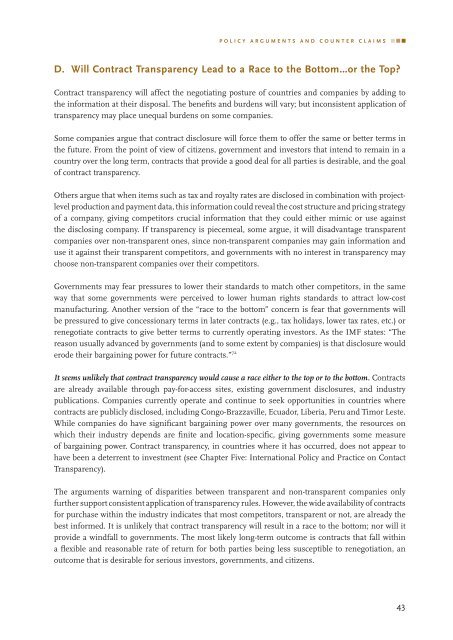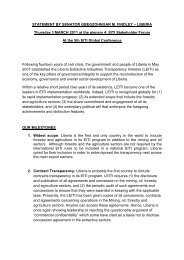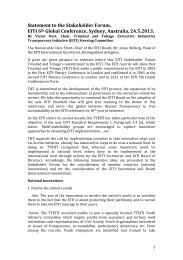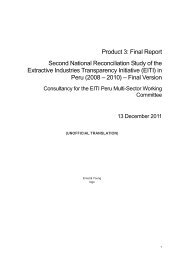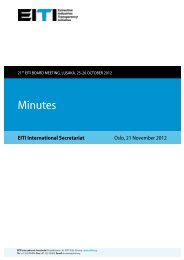CONTRACTS CONFIDENTIAL: - Good Law and Practice
CONTRACTS CONFIDENTIAL: - Good Law and Practice
CONTRACTS CONFIDENTIAL: - Good Law and Practice
You also want an ePaper? Increase the reach of your titles
YUMPU automatically turns print PDFs into web optimized ePapers that Google loves.
POLICY ARGUMENTS AND COUNTER CLAIMS<br />
D. Will Contract Transparency Lead to a Race to the Bottom…or the Top?<br />
Contract transparency will affect the negotiating posture of countries <strong>and</strong> companies by adding to<br />
the information at their disposal. The benefits <strong>and</strong> burdens will vary; but inconsistent application of<br />
transparency may place unequal burdens on some companies.<br />
Some companies argue that contract disclosure will force them to offer the same or better terms in<br />
the future. From the point of view of citizens, government <strong>and</strong> investors that intend to remain in a<br />
country over the long term, contracts that provide a good deal for all parties is desirable, <strong>and</strong> the goal<br />
of contract transparency.<br />
Others argue that when items such as tax <strong>and</strong> royalty rates are disclosed in combination with projectlevel<br />
production <strong>and</strong> payment data, this information could reveal the cost structure <strong>and</strong> pricing strategy<br />
of a company, giving competitors crucial information that they could either mimic or use against<br />
the disclosing company. If transparency is piecemeal, some argue, it will disadvantage transparent<br />
companies over non-transparent ones, since non-transparent companies may gain information <strong>and</strong><br />
use it against their transparent competitors, <strong>and</strong> governments with no interest in transparency may<br />
choose non-transparent companies over their competitors.<br />
Governments may fear pressures to lower their st<strong>and</strong>ards to match other competitors, in the same<br />
way that some governments were perceived to lower human rights st<strong>and</strong>ards to attract low-cost<br />
manufacturing. Another version of the “race to the bottom” concern is fear that governments will<br />
be pressured to give concessionary terms in later contracts (e.g., tax holidays, lower tax rates, etc.) or<br />
renegotiate contracts to give better terms to currently operating investors. As the IMF states: “The<br />
reason usually advanced by governments (<strong>and</strong> to some extent by companies) is that disclosure would<br />
erode their bargaining power for future contracts.” 72<br />
It seems unlikely that contract transparency would cause a race either to the top or to the bottom. Contracts<br />
are already available through pay-for-access sites, existing government disclosures, <strong>and</strong> industry<br />
publications. Companies currently operate <strong>and</strong> continue to seek opportunities in countries where<br />
contracts are publicly disclosed, including Congo-Brazzaville, Ecuador, Liberia, Peru <strong>and</strong> Timor Leste.<br />
While companies do have significant bargaining power over many governments, the resources on<br />
which their industry depends are finite <strong>and</strong> location-specific, giving governments some measure<br />
of bargaining power. Contract transparency, in countries where it has occurred, does not appear to<br />
have been a deterrent to investment (see Chapter Five: International Policy <strong>and</strong> <strong>Practice</strong> on Contact<br />
Transparency).<br />
The arguments warning of disparities between transparent <strong>and</strong> non-transparent companies only<br />
further support consistent application of transparency rules. However, the wide availability of contracts<br />
for purchase within the industry indicates that most competitors, transparent or not, are already the<br />
best informed. It is unlikely that contract transparency will result in a race to the bottom; nor will it<br />
provide a windfall to governments. The most likely long-term outcome is contracts that fall within<br />
a flexible <strong>and</strong> reasonable rate of return for both parties being less susceptible to renegotiation, an<br />
outcome that is desirable for serious investors, governments, <strong>and</strong> citizens.<br />
43


